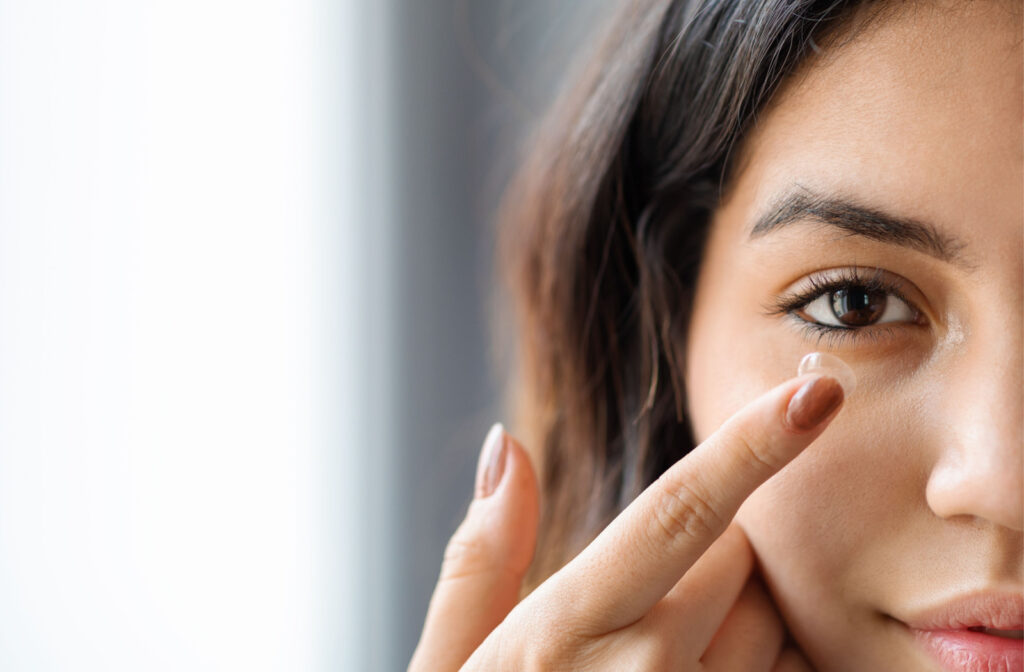When wearing contact lenses, it is common to experience dry eyes. This can be uncomfortable and even painful, making many wonder if contacts are causing their dry eye symptoms.
While contact lenses can contribute to dry eyes, this is not always the case. There are a variety of factors that can cause dry eyes, including:
- Insufficient tear production
- Contact lens material or solution
- Environmental factors
- Allergies or underlying medical conditions
If you are experiencing dry eyes while wearing contacts, it is important to determine the root cause to find the best solution. Here are some potential reasons why your contacts may be causing dry eyes and what you can do about it.
Insufficient Tear Production
Tears play a crucial role in keeping our eyes moist and comfortable. Tears act as a buffer between the lens and the eye when wearing contact lenses, making sure that the lens stays hydrated and moves smoothly with each blink.
However, some people may not produce enough tears to keep their eyes adequately lubricated while wearing contacts. This can be due to a condition called dry eye syndrome or simply genetics. In these cases, contact lenses can exacerbate dry eye symptoms.
If you suspect insufficient tear production may be causing your dry eyes, speaking with an optometrist is important. They can prescribe lubricating eye drops or recommend a different type of contact lens that may be more suitable for your eyes’ needs.
Contact Lens Material
The material of your contact lenses can also contribute to dry eyes. Some people may have a sensitivity or allergy to certain materials, causing their eyes to become dry, red, or itchy.
If you are experiencing discomfort while wearing your contacts, speak with your optometrist about trying a different lens type. Many options are available, including silicone hydrogel lenses designed to retain moisture and allow more oxygen flow to the cornea. Your optometrist can help you find the best material for your eyes.
Contact Lens Solution
The type of contact lens solution you use can also play a role in dry eyes. Some solutions may contain preservatives that can irritate sensitive eyes, causing them to become dry and uncomfortable.
If you suspect your contact lens solution may be contributing to your dry eyes, try switching to a preservative-free option. Be sure to consult with your optometrist before making any changes, as they can provide recommendations so you can choose a safe solution for your specific lenses.
Properly cleaning and storing your contact lenses is also important to avoid dry eyes. Always follow the instructions provided by your eye care professional, and never use tap water or saliva to clean your lenses, as this can introduce harmful bacteria and irritants.
Environmental Factors
Dry eyes can also be caused by environmental factors. Exposure to dry air, wind, or smoke can cause tears to evaporate more quickly, leading to dryness and discomfort.
To help combat these effects, consider using a humidifier in your home or office to add moisture to the air. Also, wearing wraparound sunglasses can help protect your eyes from wind and smoke.
Allergies or Underlying Medical Conditions
In some cases, dry eyes may be a symptom of allergies or an underlying medical condition. Allergies can cause inflammation in the eye, leading to dryness and discomfort.
Other conditions such as blepharitis (inflammation of the eyelids), Sjogren’s syndrome (an autoimmune disorder), or diabetes can also contribute to dry eyes. If you suspect that your dry eyes may be caused by an underlying medical condition, it is important to consult an optometrist for proper diagnosis and treatment.
Finding the Proper Fit: Contact Lenses for Dry Eyes
If you have dry eyes, choosing the right contact lens for your needs is important. Various options are available, including soft, rigid gas permeable (RGP), and hybrid lenses.
Soft Contact Lenses
Soft contact lenses are often a popular choice for those with dry eyes as they contain a high water content and tend to be more comfortable. However, they can also be more prone to drying out, especially if you have an underlying medical condition.
Rigid Gas Permeable (RGP) Contact Lenses
RGP lenses are made of a harder material, allowing for better oxygen flow and may be more suitable for dry eyes. However, they can take some time to get used to and may not be as comfortable as soft lenses.
Hybrid Contact Lenses
Hybrid lenses combine the features of both soft and RGP lenses, with a rigid centre surrounded by a soft outer layer. They can provide the best of both worlds in terms of comfort and oxygen flow, making them a good option for those with dry eyes.

Find the Perfect Contact Lens for You
Regardless of the type of contact lens you choose, you must follow proper hygiene and cleaning instructions to prevent the buildup of debris or bacteria that can contribute to dry eyes. Additionally, if your current contact lens material or brand is causing discomfort, consider switching to a different one that suits your needs better. Our Alcona Eye Care Centre team can help you find the right contact lens for your dry eyes. We offer various options and can provide personalized recommendations based on your individual needs. Don’t let dry eyes hold you back from enjoying clear vision—schedule an appointment today to discuss your contact lens options!




